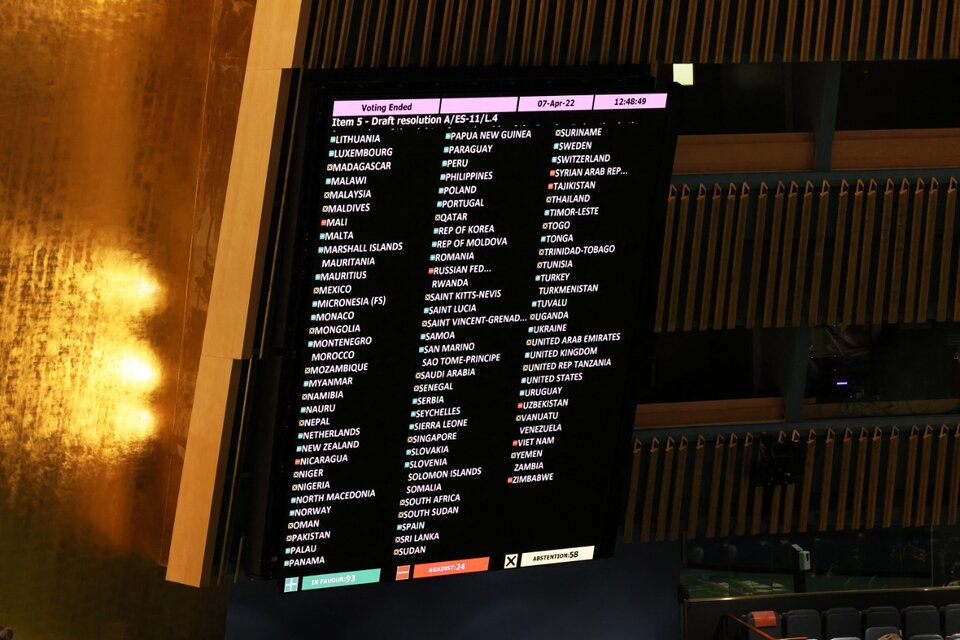
Featured image: UN General Assembly voting board. Photo: www.un.org

Orinoco Tribune – News and opinion pieces about Venezuela and beyond
From Venezuela and made by Venezuelan Chavistas

Featured image: UN General Assembly voting board. Photo: www.un.org
By Atilio Boron – Apr 7, 2022
This Thursday [April 7] the UN General Assembly approved a resolution suspending Russia’s participation in the UN Human Rights Council. The result of the vote disappointed the United States government, the promoter of the initiative, because Washington hoped that the overwhelming majority support for two resolutions voted in March and condemning Russia’s invasion of Ukraine would be repeated. On that occasion, 141 countries voted in favor of the first one and 140 did so a few days later.
Extreme vagueness
On this occasion, however, Washington’s proposal was supported by 93 countries, while 24 voted against it, and there were 58 abstentions. The resolution was approved because it exceeded two-thirds of the valid votes, that is, in favor or against, without taking into account the abstentions. Yet it is no mystery to anyone that, in real numbers, almost half of the countries represented in the General Assembly did not support the US initiative. One possible reason for this may be the extreme vagueness of the resolution proposed by the United States. The resolution reads:
“This brief resolution expresses grave concern about the ongoing human rights and humanitarian crisis in Ukraine, in particular about reports of human rights violations and abuses and violations of international humanitarian law by the Russian Federation, including violations and flagrant and systematic abuses of human rights.”
RELATED CONTENT: UN Suspends Russia from UN Human Rights Council, Venezuela Not Allowed to Vote
The curious thing about the case is that neither the General Assembly nor the UN Human Rights Council had in their hands any objective and impartial report on the events that allegedly occurred. In other words, Russia’s participation in the HRC was temporarily suspended due to “reports” that were not produced by any responsible body of the United Nations system and, almost certainly, by the media or communication platforms related to—or dependent on—the governments of the United States and Europe. In other words, the Irurzun Doctrine was applied in the international arena: someone, in this case a country, is suspected of violating human rights and, while the evidentiary reports are being prepared, a sanction is applied. In the case of Argentina: presumption of a crime committed by a troublesome politician or official, and while its commission is confirmed, a preventive detention is ordered. The same was done at the UN today: in the absence of reports, a member-state—and on top of it a permanent member of the Security Council—was suspended. A true legal monstrosity and increasingly serious damage to international law.
White House initiative
Unfortunately, the Argentine government supported this White House initiative. Our country holds the pro-tempore presidency of CELAC, and the block split in the vote. Eighteen countries voted in favor (Antigua, Argentina, Bahamas, Colombia, Costa Rica, Chile, Dominica, Grenada, Guatemala, Haiti, Honduras, Jamaica, Panama, Paraguay, Peru, Dominican Republic, Saint Lucia, and Uruguay), 11 abstained (Barbados, Belize, Brazil, El Salvador, Guyana, Mexico, Saint Kitts, Saint Vincent and the Grenadines, Saint Cristobal, Suriname, and Trinidad and Tobago), and three voted against: Bolivia, Cuba and Nicaragua. Venezuela could not vote because due to the US blockade it is in arrears in the payment of its membership fees, but it is obvious that it would have voted against the initiative. A serious mistake committed by our government. It should have taken note of what the Brazilian representative said: “Brazil has decided to abstain in today’s vote because it believes that the commission of inquiry should be allowed to complete its independent investigation so that responsibilities can be determined.” This warning was not taken into account by our representative, who agreed to sanction a country without reliable supporting evidence. I suppose that the pressure from Washington on all the Latin American and Caribbean countries must have been great, but that is no excuse. If Argentina did not want to or could not vote against the US proposal, due to Argentina’s vulnerability because of its foreign debt, it should have abstained. And this should have been done for several reasons.
RELATED CONTENT: Russia’s Invasion of Ukraine Signifies the End of an Era of Unipolar American Power
First, due to the absence of reliable evidence, which constitutes a fundamental violation of due process, as valid in international affairs as in domestic politics. Second, because in October 2020 the Argentine government signed a Strategic Association Agreement with the Russian Federation, extremely convenient in economic and diplomatic terms, which now runs the risk of being suspended or terminated. In exchange for what? Will “US investments now rain” for the big public infrastructure and welfare schemes that this country needs and for which Russia collaborated? And third, due to the undermining of the word of the president. Let us remember that two months ago President Fernández told Vladimir Putin that Argentina could be the “door” for Russia to strengthen economic ties with Latin Aemrican countries, something that now seems uncertain, and none of this helps Argentina as a nation.
Pyrrhic victory
I conclude: this was a pyrrhic and dubious victory for White House diplomacy. It was also a serious setback to its final goal: to expel Russia from the Security Council and the G-20, which seems to have been opposed by several countries, including Argentina. And the vote was a mistake that could be very costly for our government, without any benefit in sight, which could have opted, like almost half of the CELAC members, for abstention.
Featured image: UN General Assembly voting board. Photo: www.un.org

Atilio A. Borón is a Harvard Graduate professor of political theory at the University of Buenos Aires and was executive secretary of the Latin American Council of Social Sciences (CLACSO). He has published widely in several languages a variety of books and articles on political theory and philosophy, social theory, and comparative studies on the capitalist development in the periphery. He is an international analyst, writer and journalist and profoundly Latinoamerican.